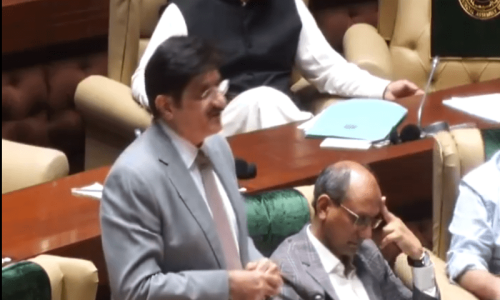KARACHI, March 28: One-third of the world’s population lacks access to essential drugs while up to 90 per cent of medicines are purchased through private shops in developing countries. These facts were highlighted at the People’s Health Assembly organized as part of the ongoing World Social Forum in Karachi.
Dr Ahsan Jamil, Shama Dossa, Prof Abdul Ghaffar Biloo, Dr Sadiq Bhanbro and Dr Sheikh Tanveer Ahmed speaking at the moot organized by the Peoples Health Movement — Sindh Chapter — mentioned that up to 90 per cent of the household budget in developing countries was spent on purchasing drugs.
“Currently, an estimated 40 million people die annually, 13 million of which occur among children up to five years of age,” Dr Ahsan Jamil said.
Expressing concern over the existent drug pricing mechanism, he observed that ad hoc drug pricing policies, inconsistent approach with regard to GST on drugs, and the issue of non-availability of essential drugs needed to be addressed with absolute sincerity.
He opined that like in many developing countries, we too succumbed to the pressure of multinationals, providing the latter a broad profitability margin. Consequently, public interest was superseded by private interests.
Dr Jamil mentioned that the Federal Drug Act 1976 strictly regulated drug prices. However, partial deregulation of drugs in the coming years had led to a significant escalation in drug prices.
Prof Abdul Ghaffar Billoo, Founder Chairman of Health and Nutrition Development Society (HANDS) and professor of paediatrics identified inequality and inequity, poverty, exploitation, violence, injustice and poor governance as the root cause for the poor health care system in a majority of the developing countries.
He observed that health had become a social, economic and political issue, adding that 45 per cent Pakistanis lived below the poverty line with inadequate civic facilities. They had no access to piped water supply and health care, he said.
“About 600,000 of our children die every year of easily preventable disease, while a woman dies every 20 minutes sue to inadequate delivery facilities,” Prof Biloo said.
Dr Sadiq Bhanbro focussing his presentation on public-private partnership in the health sector said non-availability of staff, medicine and equipment, poor management, inadequate supervision and monitoring, poor maintenance and repair of health care facilities topped the list of problems.
He said commitment and sincerity could make a difference, referring to the health care model of the Punjab Rural Support Programme at Rahimyar Khan, an initiative of the Punjab Chief Minister, Chaudhri Pervaiz Ellahi.
“It is a successful model of public-private partnership, where one can witness patient turnover to have increased by more than 200 per cent,” said Dr Bhanbro, associated with the Community Health Sciences Department of a medical university in Karachi.
Dr Shaikh Tanveer Ahmed, Executive Coordinator, People’s Health Movement said it was in 1979 that 150 countries, attending the Alma Ata Conference, had adopted a declaration known as “Health for All by 2000”.
He said though the dream was not achieved by most developing countries, many initiatives had been adopted by civil societies based in third world since then.
He referred to the establishment of a World Health Assembly in 1985, International People’s Health Council 1990 that linked health with poverty, hunger and unfair socio-economic structures.
The Peoples Health Assembly is being organized regularly since 1998 while Public Health Movement was launched in 2000 in Bangladesh and attended by 1,453 delegates from 75 countries.
The panel comprising Kauser Khan, Dr Shershah Syed and Prof A G Billoo discussed different aspects of the case studies presented by the community health workers.
Shahana Dossa, the PHA Coordinator presented the Global Health Watch Report.
—APP














































Dear visitor, the comments section is undergoing an overhaul and will return soon.